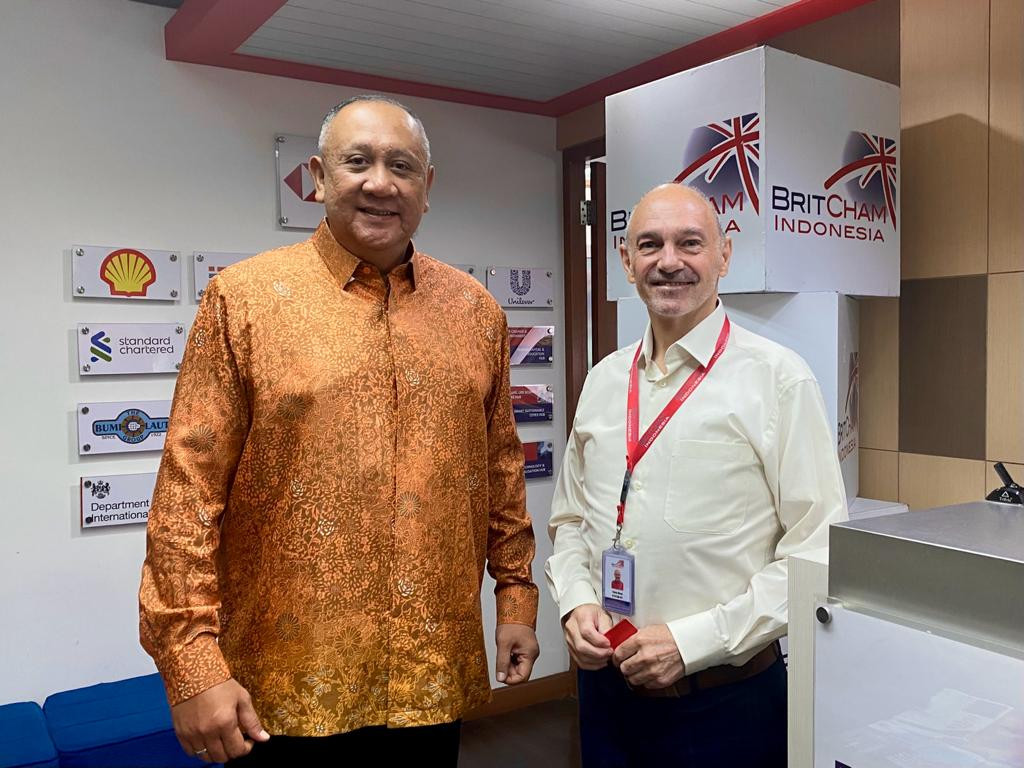Popular Reads
Top Results
Can't find what you're looking for?
View all search resultsPopular Reads
Top Results
Can't find what you're looking for?
View all search resultsBritCham eyes green investment, ASEAN supply chains
The chairman of the British Chamber of Commerce in Indonesia spoke to The Jakarta Post’s Adisti Sukma Sawitri and Ruth Dea Juwita about the country's green investment opportunities, British firms’ involvement in the Just Energy Transition Partnership (JETP), mineral export bans and a potential bilateral trade agreement.
Change text size
Gift Premium Articles
to Anyone
F
or more than four decades, the British Chamber of Commerce in Indonesia (BritCham) has served as a platform for British and Indonesian companies to network, collaborate and promote bilateral trade and investment.
BritCham chairman Rino Donosepoetro spoke to The Jakarta Post’s Adisti Sukma Sawitri and Ruth Dea Juwita about green investment opportunities in Indonesia, British firms’ involvement in the Just Energy Transition Partnership (JETP), critical mineral export bans and a potential bilateral trade agreement.
Question: Where does BritCham see green investment opportunities in Indonesia?
Answer: UK businesses want to engage actively in sustainable practices, be it by greening the supply chain, developing sustainable infrastructure, or diving into green finance. This isn't just a matter of goodwill. They're viable commercial sectors, especially in the realm of the energy transition and renewables.
Green initiatives and sustainable development are top priorities from the commercial standpoint. British banks like HSBC and Standard Chartered have been leading in Indonesian green financing.
British financial institutions in banking and insurance play a key role. International financial institutions are coming in, not only to provide financial support and loans, but also to invest as equity stakeholders, driving projects.
What opportunities do you see in JETP in particular?
Indonesia is the largest JETP country in the world, and the impact of climate financing carries a stronger weight for every pound spent here.
There are four parts of the JETP: retiring coal power plants, investing in the electricity grid, advancing renewable energy and enhancing the renewable energy value chain.
We fully support the Indonesian government's commitment to dive deeper into the value chain. From a financing perspective, the renewable energy bill is notably straightforward. Collaborating with the Glasgow Financial Alliance for Net Zero (GFANZ) and the International Partner Group (IPG), we aim to aid Indonesia in the retirement of coal power plants.
The earlier financing of the project revolves around project finance. Following that, whether you opt to retire coal power plants or to construct the power grid, these projects require considerable funding. Refinancing becomes crucial, drawing in key players, such as fund managers, asset managers and major insurance companies.
Efforts are underway to secure financing from financial institutions through a tendering process. This approach involves providing staple financing, meaning that the JETP doesn't assess us on a project-by-project basis, and financiers can't selectively fund projects. Financiers can't cherry-pick projects; it's rather a comprehensive package.
We’re now waiting for President [Joko “Jokowi” Widodo] to launch the pilot project. We’re hopeful that one of these will come out at some point this year. By COP28, we’re hoping to see concrete progress toward achieving the US$20 billion being directed this way.
How does BritCham view Indonesia’s policy on critical minerals, particularly the ban on exports of nickel, bauxite and now copper and quartz sands?
The situation is a matter of choice. The elimination of certain options actually forced us into the decision to evaluate if the relationship is strong enough to match our intentions. We're happy; on the long-term basis we want to have a relationship with Indonesia. Therefore, we will invest in certain cities.
We completely understand Indonesia's reasoning, which is linked to the downstream effects. We see positive impacts for Indonesia's domestic economic development by driving downstream activities.
The potential for trade limitations is influenced by market dynamics, which may lead to trade-offs.
The crucial focus here is on downstream activities, fostering industrialization, job creation, sponsorship and so on. From the private-sector perspective, we see the opportunity for our company members to expand their involvement and benefit.
In light of the export ban, do you see any manufacturing opportunities coming up, or do we have to wait for that?
I don't think we see that opportunity for now. While we understand Indonesia's current monetary impact, there are plenty of other chances for British companies to get involved. These opportunities cover various areas, including technology and financing, all linked to Indonesia's industrialization.
What I want to stress is the need for transparency in the global supply chain. Looking further ahead, the UK and Indonesia are focusing on ASEAN. We've recently initiated ASEAN integration for banks, strategic projects and industries at the ministerial level.
It's possible to collaborate on, for example, EV production within ASEAN, a region with immense potential in the global supply chain. We strongly believe that ASEAN is poised to claim a larger share of the world's supply chain.
Does BritCham see any immediate need for separate bilateral agreements like the Comprehensive Economic Partnership Agreement (CEPA)?
From BritCham's standpoint, we observe and commend the progress that has been made so far. Both investments and trade flow between the two countries are significant. We want this positive momentum to persist and naturally gain even more momentum through our private sector efforts, since we’ve seen that government-to-government [efforts] have included us as well.
Our current negotiation platform at the ministerial level is the Joint Economic and Trade Committee (JETCO). There have been two positive JETCO discussions in Indonesia, marking a promising start for progress in this direction.
But we’re quite optimistic that this could potentially lead to the realization of a sequential free trade agreement [FTA]. We would warmly welcome this status change in the future.










